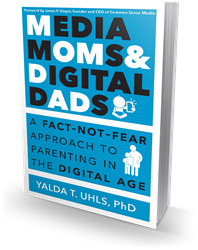What should we as parents know about technology in our kids’ lives? Common Sense is an independent, non-profit organization that helps kids thrive in a world of media & technology that Rates, Educates & Advocates. This organization sponsored a presentation at my son’s middle school which I had the benefit to attend. The speaker was author Yalda T. Uhls, MBA, PhD. She is an award winning child psychologist and leading expert on the effects of media on children. Her book, “Media Moms & Digital Dads” was the topic of conversation.

Dr. Uhls answered a lot of questions and left me with a sense of ease and with a list of do’s & don’t’s.
Some common parental questions regarding technology in our kids’ lives:
- How much screen time is ok for my kids? How can I set limits?
- Are some kinds of screen time better than others?
- Should we be concerned with privacy?
- Is addiction a possibility?
- When should we introduce mobile technology?
- At what age can we allow social media and which apps?
The author explained that content matters. Great content can teach and inspire. She used Minecraft as an example. It’s a sandbox-style game with open on-line play that fosters creativity. If you have a child that loves to play Minecraft, approach it as a learning opportunity. Kids have free-reign over one-of-a-kind-worlds bolstered by deep customization options, frequent updates that add new challenges and content. It’s pure creativity!
Dr. Uhl’s research findings on YouTube were surprising. As parents, we worry about what our children are really watching. We know that they can encounter inappropriate media for their age. But when you think about what kids are actively seeking out, a lot of it is just kind of weird.
When kids are guided by their interests, curiosity, and things that are funny to them, they tend to find interesting, creative, humorous results. It’s too bad that they’re exposed to mature content along the way. But that’s where you can step in and help them separate the good stuff from the bad stuff.
When it comes to the average daily use for social media and gaming, the differences between boys and girls in their tweens and teens are striking! I learned that during the pre-teen and teen years, kids are addicted to their friends and not necessarily technology.

What I took away from this informative session are pathways that will help me navigate through this fast-paced technological age in which our children are immersed. It also left me with more of an open mind when it comes to technology’s place in their lives.
- Working together to create a positive media environment for our children will teach them to stay safe, think first and stay balanced.
- Talk to your kids …ask how they are. Then ask again. Check in with your kids. They may be absorbing subtle social messages in “not so healthy” ways.
- Hit the pause button. Encourage your kids to “take it off-line.” This will at least give your kid time to process how to act.
- Read between the lines. Kids need guidance and an empathetic ear. Listen and guide, but hold off on judgments.
- Walk in another person’s shoes. Encourage your child to consider all perspectives.
- Help set boundaries. Find ways to help your child own strategies to manage their media use. Consider one designated open area for your kids to use their technology. For instance, the Family Room. Being exposed may help sway kids from making bad viewing decisions on the internet.
- As parents, we need to watch our own media behavior. I learned that children think their parents check their devices too often. This leaves them feeling unimportant since we, their parents, are distracted.
- Social Media …Tell your kids:
- We need to use teachable moments and remind them that the internet is not written in pencil; rather, it’s written in pen. Teach them to never say anything they wouldn’t say face-to-face.
- Consider a Family Media Agreement or Device Contract.
- “Friend” your kids and ally with other parents.
- Emphasize creating a positive digital footprint and respect privacy — their own and others’.
As a parent, I struggle with technology and my child. But after listening to Yalda T. Uhls’ conclusions on the topic, it’s taken many of my fears away. I received some great advice which I will implement. If you enjoyed this post, you will enjoy reading So Your Kids Want to Go To College and How to Raise a Good Decision Maker.




